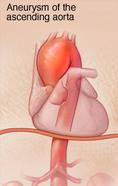
McGowan Institute for Regenerative Medicine affiliated faculty member Julie Phillippi, PhD, assistant professor in the Department of Cardiothoracic Surgery, University of Pittsburgh School of Medicine, is the principal investigator of a National Institutes of Health R56 “Bridge Award.” The project is entitled “Engineered Neovascularization of Vasa Vasorum” and includes McGowan Institute faculty co-investigators Thomas Gleason, MD, associate professor of Surgery, Department of Cardiothoracic Surgery, University of Pittsburgh School of Medicine, Vera Donnenberg, PhD, associate professor of cardiothoracic surgery in Pitt’s School of Medicine, Phil Campbell, PhD, research professor at the Institute for Complex Engineered Systems at the Carnegie Institute of Technology (School of Engineering) at Carnegie Mellon University (CMU), and Lee Weiss, PhD, research professor in the Robotics Institute at CMU.
This project addresses the clinically significant problem of ascending thoracic aortic aneurysm (TAA). Patients with TAA have a high risk of aortic catastrophe such as a free rupture or aortic dissection. Free rupture often results in sudden death and aortic dissection poses mortality rates worldwide of over 90% in the absence of surgical intervention. Despite progress in understanding mechanisms of biomechanical weakening within the aortic media in TAA, an existing barrier to improving patient care is an incomplete knowledge of the involvement of the adventitia in aortic wall homeostasis.
Dr. Phillippi’s laboratory identified vasa vasorum remodeling in the adventitia of human TAA specimens associated with down-regulation of upstream modulators of endothelial function including angiogenic and hypoxic gene targets and evidence of hypoxia in the medial layer. This project will test the hypothesis that TAA is mediated by hypoxia-driven deficiency in vascular endothelial growth factor signaling causing limited neovascularization of vasa vasorum by adventitial cells. In support of this hypothesis, preliminary studies from Dr. Phillippi’s group revealed that pluripotential vasa vasorum-associated pericytes in human aorta were capable of forming and stabilizing endothelial networks and were co-localized with endothelial cells in a perivascular location, thus uncovering a repository of resident progenitor cells that could be harnessed for their angiogenic potential.
To elucidate mechanisms of vasa vasorum dysfunction in the adventitia, the first phase of the project will evaluate the impact of hypoxia on vasa vasorum endothelial function in aneurysmal specimens from human adult thoracic aorta. To engineer neovascularization of pericytes, the second phase of the project will direct vasa vasorum pericytes toward functional smooth muscle and endothelial cell lineages. To demonstrate the translational feasibility of an established inkjet- based growth factor biopatterning strategy to regenerate native vasa vasorum in TAA, the third phase of the project will engineer neovascularization by vasa vasorum-associated pericytes within an in vivo angiogenic model and an in situ arterial explant model.
The overall impact of this work will be the increased knowledge of mechanisms of endothelial dysfunction in the adventitia of TAA which could help transform the surgical approach to treatment using an inkjet- based deposition system to restore a healthy vasa vasorum network. The clinical translation potential of this work is an engineered off-the-shelf and minimally invasive therapy for TAA as an “aortic wrap” for patients with genetically-triggered aortopathies or sporadic cases of ascending aortic dilatation. The long-term goal is to develop less invasive and regenerative medicine-based approaches to treat patients affected by aneurysm.
Illustration: Mayo Clinic.
